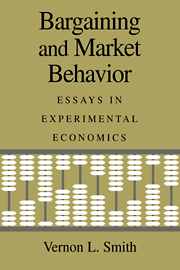Book contents
- Frontmatter
- Contents
- Preface
- Part I Economics and Psychology
- Part II Bargaining Theory, Behavior, and Evolutionary Psychology
- Part III Institutions and Markets
- INTRODUCTION
- 10 Reflections on Some Experimental Market Mechanisms for Classical Environments
- 11 Experimental Methods in the Political Economy of Exchange
- 12 Individual Rationality, Market Rationality, and Value Estimation
- 13 Market Contestability in the Presence of Sunk (Entry) Costs
- 14 The Boundaries of Competitive Price Theory: Convergence, Expectations, and Transaction Costs
- 15 Off-Floor Trading, Disintegration, and the Bid–Ask Spread in Experimental Market
- 16 Bertrand-Edgeworth Competition in Experimental Markets
- 17 An Experimental Examination of the Walrasian Tâtonnement Mechanism
- Part IV Stock Markets and Bubbles in the Laboratory
- References
- Index
15 - Off-Floor Trading, Disintegration, and the Bid–Ask Spread in Experimental Market
Published online by Cambridge University Press: 29 October 2009
- Frontmatter
- Contents
- Preface
- Part I Economics and Psychology
- Part II Bargaining Theory, Behavior, and Evolutionary Psychology
- Part III Institutions and Markets
- INTRODUCTION
- 10 Reflections on Some Experimental Market Mechanisms for Classical Environments
- 11 Experimental Methods in the Political Economy of Exchange
- 12 Individual Rationality, Market Rationality, and Value Estimation
- 13 Market Contestability in the Presence of Sunk (Entry) Costs
- 14 The Boundaries of Competitive Price Theory: Convergence, Expectations, and Transaction Costs
- 15 Off-Floor Trading, Disintegration, and the Bid–Ask Spread in Experimental Market
- 16 Bertrand-Edgeworth Competition in Experimental Markets
- 17 An Experimental Examination of the Walrasian Tâtonnement Mechanism
- Part IV Stock Markets and Bubbles in the Laboratory
- References
- Index
Summary
This study has its origin in a series of meetings between the authors and various futures market exchange officials. Our interest was in identifying one or more research questions, arising in the ordinary operation of an exchange, that might be capable of examination using experimental methods. We wanted the scrutiny of exchange officials and their assistance in helping to define a set of questions that we thought would be researchable by laboratory experimentation. Initially we discussed a wide range of issues, including the problem of “off-floor” trading, which ultimately was the research focus that we mutually agreed would be a good starting candidate. We selected this problem for a number of reasons.
1. All futures and stock exchanges have rules that prohibit the members of an exchange from engaging in unauthorized off- floor trades. Consequently, the problem is of general interest within the securities industry, and we are able to ask whether such rules are warranted by the results we obtain in laboratory experimentation.
2. Off-floor trading in futures markets is known to occur in spite of penalties that have been levied on exchange members who violate these rules. This suggests that there exist endogenous incentives strong enough to overcome the penalty strictures intended to prevent such trading activity.
3. The frequency of occurrence, as well as an understanding of the circumstances of individual violations, is not known precisely by exchange officials.The fact that off-floor trades are prohibited and punishable as a major offense, and therefore are clandestine, makes it impossible to gather systematic field data on off-floor trades. Essentially, experimental evidence is the only feasible source of observations on off-floor trading.
- Type
- Chapter
- Information
- Bargaining and Market BehaviorEssays in Experimental Economics, pp. 320 - 347Publisher: Cambridge University PressPrint publication year: 2000



